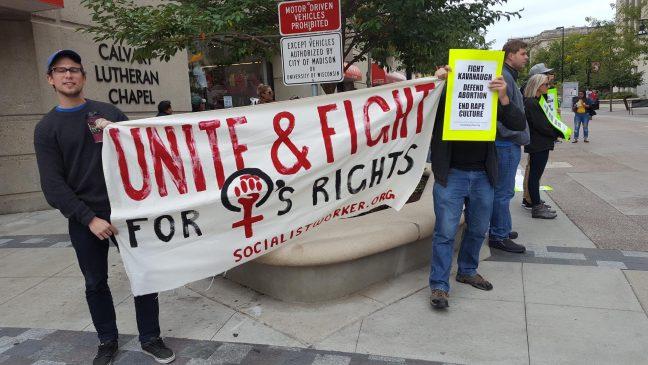Open a web browser and click on the first news article. Odds are, it’s related to the Kavanaugh hearings. Perhaps people are sick of reading about judges, nomination processes and survivors. Maybe people are tired of the Facebook posts, the Twitter alerts and the breaking news notifications that seem to come every hour.
Maybe everyone is talking about it. Maybe they won’t stop talking about it. But they shouldn’t. The conversation isn’t done yet — not even close.
Christine Blasey Ford, who accused Supreme Court nominee Brett Kavanaugh of sexually assaulting her at a high school party over three decades ago, testified before the Senate and the nation, forcing her way through graphic memories as she recounted one of the most formative moments of her life. Then Kavanaugh yelled; he fumed, berated, and belittled.
Blasey Ford was credible. Where one is expected to be vulnerable, she showed insurmountable strength. And she was, through it all, endearingly polite, cowed in front of several senators whose only wish, it seemed, was for her to fall off the face of the Earth.
Kavanaugh cannot be considered for SCOTUS until accuser is taken seriously
Above the chaos, the flashing cameras and the lack of precedent, a single singular question persisted: Is she telling the truth?
We ask this not because of reasonable doubt, but because it’s uncomfortable to believe the truth. Sometimes the stories of survivors are inconvenient. Sometimes they come out right when we don’t want them to. Sometimes we question them not because of their veracity but because of their potential to upset the status quo. Because we like that celebrity or hoped that politician would run in 2020; because, deep down, we didn’t want to believe it.
And last week, watching Blasey Ford testify — trembling, pale, holding back tears as quickly as she smiled to cover them up — one can’t help but wonder why, despite partisan lines, we suddenly became obsessed with the idea of survivors — particularly those who identify as women — formulating allegations of sexual assault, merely to strike down men in positions of power.
Almost as quickly as the #MeToo movement rose to prominence, its proponents were met with accusations that the movement had “gone too far.” Men online joked with each other, lamenting the sudden emergence of boundaries: So, what, are hugs not okay anymore? They wanna ban hugs? The #MeToo movement has gone too far!
Increasing conversation about hypermasculinity, male libido central to fight against sexual assault
Others suggested survivors were emerging merely because it was “popular,” not out of any genuine trauma or desire for justice. Permeating it all was a sense of naive fear. Suddenly, the camera lens had been reversed, and no one was safe. Women and survivors of violence everywhere let out a frustrated breath; fear wasn’t new. To them, fear was anything but uncharted territory.
Statistically, most men are unlikely to be falsely accused of sexual assault in the first place, yet fear of these allegations has risen to the same prominence, if not importance, as the trauma of the allegations themselves.
Monday, Donald Trump, Jr., told the Daily Mail he was more worried for his sons than his daughters in the burgeoning era of the #MeToo movement, noting that they might face unfounded allegations of sexual assault in the future. Soon after, frowning disapprovingly at reporters on the White House lawn, President Trump told reporters he believed it was “… a very scary time for young men in America.”
“Think of your son,” Trump went further, doubling down on his comments at a recent rally, where he mocked Blasey Ford’s testimony. “Think of your husband.”
‘It’s not the patriarchy, it’s you:’ Fox News contributor criticizes state of feminism
Many think the fear of false allegations is more important and a greater cause for action than the events. It’s like comparing apples to oranges — they couldn’t be more different besides the fact both are fruit. Except, maybe it’s not apples and oranges. Maybe it’s apples and raccoons because this comparison makes no goddamn sense, and maybe it shouldn’t have to.
Believe her. The chant of a thousand Facebook posts, rallies, and hand-painted signs. And yet, contrary to popular belief, it doesn’t mean the alleged assailant, harasser, or perpetrator is condemned. It doesn’t brand guilt instantly, without the benefit of a criminal trial. It merely asks us, as moral people, to take revelations of pain and suffering in good faith. To assume, most of the time, that a survivor would not lie about something like this. To support them through the painful process of telling their story, and taking a step toward resolution, justice or anything in between.
Believe her. Believe them.
Julia Brunson ([email protected]) is a senior majoring in history.





















